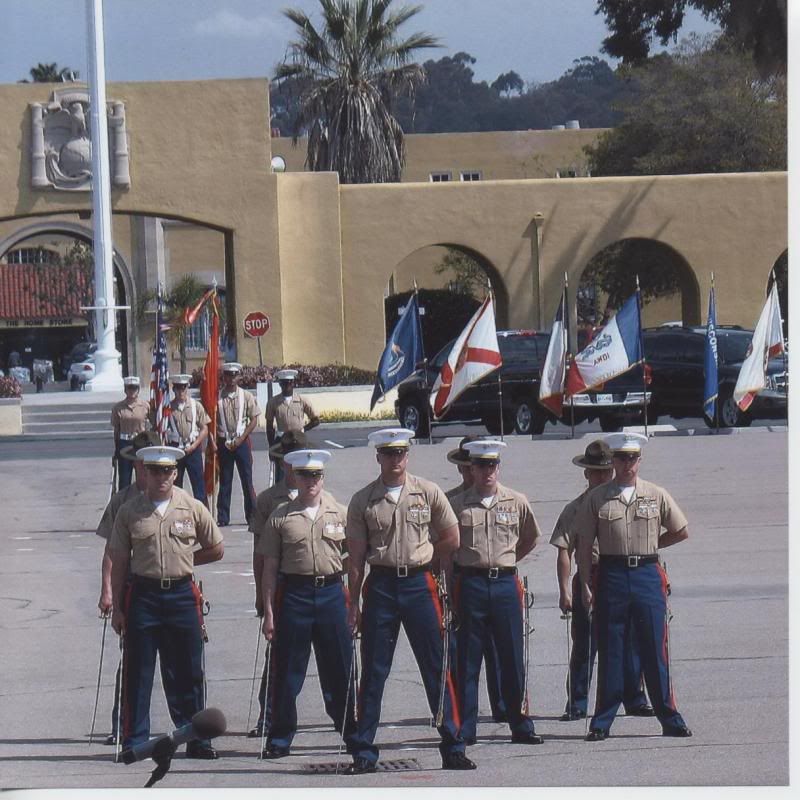

|
skimask
Since Feb 16, 2005
| |||||
|
| ||||||
Blue Angels air show during commissioning week
Graduation Day, U.S.N.A., Annapolis, MD.5/24/2002. Graduated a Midshipman, commissioned as a Marine 2nd Lieutenant.
This picture with Rummy was taken on 12/24/2004.

MCRD San Diego April 2009
The Boss.
Gary Larsons humor is priceless
create your own visited states map or check out these Google Hacks.
| Your Political Profile: |
 Social Issues: 100% Conservative, 0% Liberal Personal Responsibility: 75% Conservative, 25% Liberal Fiscal Issues: 100% Conservative, 0% Liberal Ethics: 75% Conservative, 25% Liberal Defense and Crime: 100% Conservative, 0% Liberal |
| hit counter website design |
George Washington vs. The Grand Jury
Prosecutor: Please state your name and occupation, sir.
Washington: George Washington, President of the United States.
Q: Mr. Washington, you are accused of having chopped down a cherry tree.
A: Yes, sir. But first, I would like to read a statement. "I acknowledge an inappropriate act and accept full responsibility for my actions. I appear here today as a result of a politically inspired lawsuit. Beyond this, I will refuse to answer any specific questions."
Q: Now, in your previous deposition, you denied having chopped down this tree. Is that correct?
A: Well, what I said was that there "is no evidence" connecting me to that crime.
Q: But you now admit an "inappropriate" act against that tree. Yet you deny having committed perjury.
A: Well, that depends on what the definition of "is" is. When asked the question, I responded in the present tense. Now, had the question been "Had there ever been an inappropriate action taken toward that tree," that would have been different.
Q: Did you or did you not chop down that cherry tree?
A: Define "tree."
Q: Tree: According to Webster's, "a woody perennial plant with one main stem or trunk which develops many branches, usually at some height above the ground."
A: Define "chop."
Q: Mr. Washington, there is a common-sense definition of the word "chop" that I think we can agree on. So, I repeat, sir, did you or did you not chop down that cherry tree? And I remind you, you are under oath.
A: Well, if by "chop down" you mean, did I strike the tree several times in an inappropriate fashion resulting in its falling to the ground, my answer is I have no present recollection of having delivered several chops.
Q: Did you chop the tree, Mr. Washington, one or more times, causing it to fall to the ground?
A: I refer to my earlier statement. There was, in fact, an "inappropriate" act.
Q: Did you touch, have contact with or use any object on the tree, in an inappropriate manner, causing its fall to the ground?
A: I refer to my earlier statement.
Q: Were you ever alone with the tree?
A: Well, that depends on your definition of "alone."
Q: Did you tell others that you did not chop down this tree?
A: Well, I told others that I did not deliver several chops to a cherry tree. You'll have to ask them what they thought I meant by that.
Q: So, when you told these people, do you think that they thought you had, in fact, committed an inappropriate act?
A: Well, I know that when I told them that I did not chop down the tree, I know what I meant. You'd have to ask them to find out what they thought I meant, because I know what I meant when I said it. But others might have thought I meant something different when I said what I said, but I really didn't, although they might have thought so.
Q: Did you instruct your secretary to retrieve the fallen branch?
A: Define "instruct."
Q: Did you advise, suggest or otherwise indicate to your secretary that it would be better if the tree branch had been retrieved?
A: I think I might have indicated that if the tree branch weren't available, then its non-availability would negate any retrieval. Then again, I might not have.
Q: Well, then, sir, let's try again. Did you or did you not chop down the cherry tree?
A: Define "cherry."
Q: Mr. Washington --
A: Well, is a "cherry" tree still a "cherry" tree if it has no cherries? Because I distinctly recall no such cherries on the tree in question.
Q: By that logic, Mr. Washington, a tree is no longer a tree if it has no leaves.
A: Exactly.
Q: Mr. Washington, when your lawyer submitted an affidavit by your intern, stating that you did not chop down that tree, you knew that statement to be incorrect, didn't you?
A: No, sir. I think that when she said that, she was assuming that a tree must have cherries in order for it to be, in fact, a cherry tree. As I earlier indicated, most normal people think cherries are necessary before a cherry tree could properly be called a "cherry tree." So I think that she thought that you would have thought that cherries were necessary to the definition of tree and, therefore, when she said what she said -- I didn't think what she said was wrong -- since at the time she said it, I wasn't thinking about right or wrong.
Q: Mr. Washington, is it your testimony that most normal people think that cherries are necessary for a cherry tree to remain a cherry tree?
A: Define "normal."